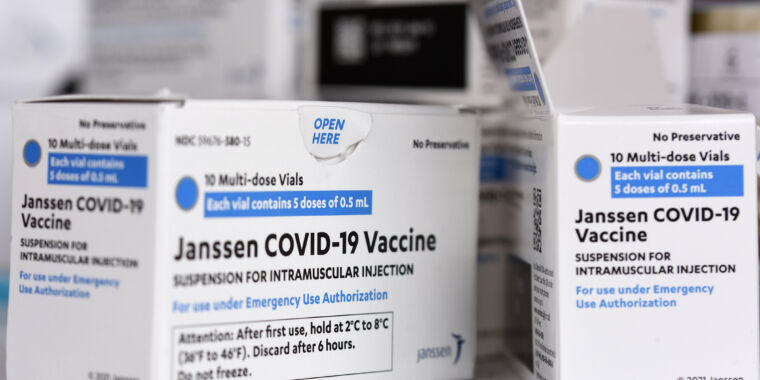The Food and Drug Administration has revoked the approval of Johnson & Johnson’s COVID-19 vaccine, ending the short-lived but troubled survival of the vaccine amid the pandemic.
of last week’s letterThe FDA’s chief vaccine regulator, Peter Marks, wrote to Jansen Biotech, the Belgium-based company responsible for vaccines owned by Johnson & Johnson, saying the agency would rescind the license. At the beginning of the letter, Marks said the retraction was at the company’s request.
Marks said Janssen’s May 22 letter notified the FDA:
The last lot of Janssen COVID-19 vaccine purchased by the U.S. government has expired, there is no demand for new lots of Janssen COVID-19 vaccine in the United States, and Janssen Biotech has no intention of renewing. There is no strain composition of this vaccine to address new variants.
last month, Listed on the Centers for Disease Control and Prevention website The remaining government stock expired on May 7, 2023, so the vaccine is no longer available in the United States, he said. To CDC data trackingAbout 31.5 million doses of the J&J vaccine were delivered to states during the pandemic, but only about 19 million doses were administered and about 12.5 million doses have expired.
The beginning of the end for the once-promising single-dose vaccine came just weeks after FDA approval on February 27, 2021. On March 13, 2021, the FDA and CDC suspended the use of the J&J vaccine due to concerns about extreme adverse effects. It is a rare clotting disorder first noted with a similar vaccine manufactured by AstraZeneca. Both vaccines used adenoviral vector-based designs, but AstraZeneca’s vaccine was not licensed for use in the United States. J&J’s vaccine moratorium lasted only 11 days, but the damage was done and demand for the vaccine plummeted and never recovered.
Meanwhile, US vaccine production has been bogged down by a scandal surrounding government contractor Emergent Biosolutions, which ruined tens of millions of doses of J&J’s COVID-19 vaccine with quality control problems and contamination. Despite raising hundreds of millions of dollars from government contracts, Emergent has a history of manufacturing law violations.
In December 2021, CDC Downgrades J&J Vaccinesaid that mRNA-based vaccines should be the priority vaccine against COVID-19. And in May 2022, the FDA limited vaccine use to people over the age of 18 who are unable or unwilling to take alternative vaccines.
The full withdrawal this month comes as the FDA prepares to discuss a new formulation of the novel coronavirus vaccine for this fall. The FDA has long held the idea of renewing the COVID-19 vaccine in the same way it does its annual flu shot, reassessing vaccine formulations in late spring and early summer and urging manufacturers to prepare for a fall launch. urged me to prepare an updated prescription.agency’s Vaccine Advisory Board to meet on June 15 We discuss the best formula for this fall.
Already, the World Health Organization’s Vaccine Advisory Committee has advised countries to switch to the latest XBB-strain monovalent vaccines this year. The omicron sublineage that governs transmission. In a statement issued on 18 May, WHO advisers urged countries to: Abolish the current divalent formulaIt targets both the ancestral SARS-CoV-2 virus and the omicron submutant, because continued targeting of the ancestral virus strain does not appear to provide enhanced protection against current strains. Furthermore, continued vaccination with the ancestral strain “reduces the concentration of new target antigens compared to monovalent vaccines.”
An FDA advisory meeting on June 15 will discuss reformulations as they apply to mRNA vaccines from Pfizer BioNTech and Moderna. Novavax to make protein-based vaccine We are also working on the latest COVID-19 vaccine available in the US against the XBB strain.



